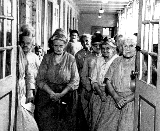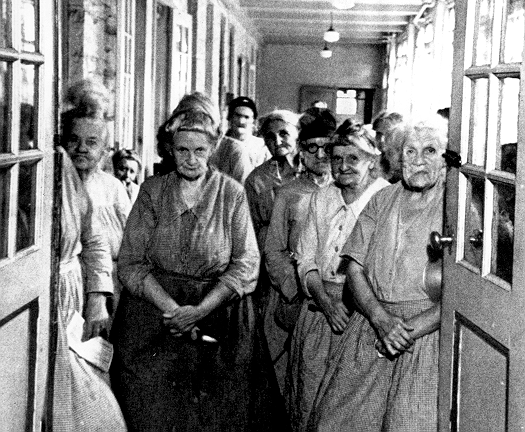
Poorhouse
Encyclopedia

County
A county is a jurisdiction of local government in certain modern nations. Historically in mainland Europe, the original French term, comté, and its equivalents in other languages denoted a jurisdiction under the sovereignty of a count A county is a jurisdiction of local government in certain...
or municipality
Municipality
A municipality is essentially an urban administrative division having corporate status and usually powers of self-government. It can also be used to mean the governing body of a municipality. A municipality is a general-purpose administrative subdivision, as opposed to a special-purpose district...
.
In England
England
England is a country that is part of the United Kingdom. It shares land borders with Scotland to the north and Wales to the west; the Irish Sea is to the north west, the Celtic Sea to the south west, with the North Sea to the east and the English Channel to the south separating it from continental...
, Wales
Wales
Wales is a country that is part of the United Kingdom and the island of Great Britain, bordered by England to its east and the Atlantic Ocean and Irish Sea to its west. It has a population of three million, and a total area of 20,779 km²...
and Ireland
Ireland
Ireland is an island to the northwest of continental Europe. It is the third-largest island in Europe and the twentieth-largest island on Earth...
(but not in Scotland
Scotland
Scotland is a country that is part of the United Kingdom. Occupying the northern third of the island of Great Britain, it shares a border with England to the south and is bounded by the North Sea to the east, the Atlantic Ocean to the north and west, and the North Channel and Irish Sea to the...
) a poorhouse was more commonly known as a workhouse
Workhouse
In England and Wales a workhouse, colloquially known as a spike, was a place where those unable to support themselves were offered accommodation and employment...
. In early Victorian times (see Poor Law
Poor Law
The English Poor Laws were a system of poor relief which existed in England and Wales that developed out of late-medieval and Tudor-era laws before being codified in 1587–98...
), poverty was seen as a dishonourable state caused by a lack of the moral virtue
Virtue
Virtue is moral excellence. A virtue is a positive trait or quality subjectively deemed to be morally excellent and thus is valued as a foundation of principle and good moral being....
of industriousness (or industry as it was called). As was depicted by Charles Dickens
Charles Dickens
Charles John Huffam Dickens was an English novelist, generally considered the greatest of the Victorian period. Dickens enjoyed a wider popularity and fame than had any previous author during his lifetime, and he remains popular, having been responsible for some of English literature's most iconic...
, a workhouse could resemble a reformatory
Reformatory
Reformatory is a term that has had varied meanings within the penal system, depending on the jurisdiction and the era. It may refer to a youth detention center, or an adult correctional facility. The term is still in popular use for adult facilities throughout the United States, although most...
and house children, either with families or alone, or a penal labour
Penal labour
Penal labour is a form of unfree labour in which prisoners perform work, typically manual labour. The work may be light or hard, depending on the context. Forms of sentence which involve penal labour include penal servitude and imprisonment with hard labour...
regime to give the poor work at manual labour and subject them to physical punishment
Corporal punishment
Corporal punishment is a form of physical punishment that involves the deliberate infliction of pain as retribution for an offence, or for the purpose of disciplining or reforming a wrongdoer, or to deter attitudes or behaviour deemed unacceptable...
. As the 19th century progressed, conditions became better.
The term is commonly applied to such a facility that housed the destitute elderly; institutions of this nature were widespread in the United States
United States
The United States of America is a federal constitutional republic comprising fifty states and a federal district...
prior to the adoption of the Social Security
Social Security (United States)
In the United States, Social Security refers to the federal Old-Age, Survivors, and Disability Insurance program.The original Social Security Act and the current version of the Act, as amended encompass several social welfare and social insurance programs...
program in the 1930s. Facilities housing indigents who are not elderly are typically referred to as homeless shelters
Homelessness
Homelessness describes the condition of people without a regular dwelling. People who are homeless are unable or unwilling to acquire and maintain regular, safe, and adequate housing, or lack "fixed, regular, and adequate night-time residence." The legal definition of "homeless" varies from country...
, or simply "shelters," in current usage.
Often the poorhouse was situated on the grounds of a poor farm on which able-bodied residents were required to work; such farms were common in the United States
United States
The United States of America is a federal constitutional republic comprising fifty states and a federal district...
in the 19th and early 20th centuries; it could even be part of the same economic complex as a prison farm
Prison farm
A prison farm is a large correctional facility where penal labor convicts are put to economical use in a 'farm' , usually for manual labour, largely in open air, such as in agriculture, logging, quarrying, etc...
and other penal or charitable public institutions.
Poor farm
Poor farms were county or town-run residences where paupers (mainly elderly and disabled people) were supported at public expense. They were common in the United States beginning in the middle of the 19th century and declined in use after the Social Security Act took effect in 1935 with most disappearing completely by about 1950.Most were working farms that produced at least some of the produce, grain, and livestock they consumed. Residents were expected to provide labor to the extent that their health would allow, both in the fields and in providing housekeeping and care for other residents. Rules were strict and accommodations minimal.
Poor farms were the origin of the U.S. tradition of county governments (rather than cities, townships, or state or federal governments) providing social services for the needy within their borders; the federal government did not participate in social welfare for over 70 years following the 1854 veto of the Bill for the Benefit of the Indigent Insane
Bill for the Benefit of the Indigent Insane
The Bill for the Benefit of the Indigent Insane was proposed legislation that would have established asylums for the indigent insane, and also blind, deaf, and dumb, via federal land grants to the...
by Franklin Pierce
Franklin Pierce
Franklin Pierce was the 14th President of the United States and is the only President from New Hampshire. Pierce was a Democrat and a "doughface" who served in the U.S. House of Representatives and the Senate. Pierce took part in the Mexican-American War and became a brigadier general in the Army...
. This tradition has continued and is in most cases codified in state law, although the financial costs of such care have been shifted in part to state and federal governments. Anne Sullivan
Anne Sullivan
Johanna "Anne" Mansfield Sullivan Macy , also known as Annie Sullivan, was an American teacher best known as the instructor and companion of Helen Keller.-Early life:Sullivan was born on April 14, 1866 in Feeding Hills, Massachusetts...
, Helen Keller
Helen Keller
Helen Adams Keller was an American author, political activist, and lecturer. She was the first deafblind person to earn a Bachelor of Arts degree....
's teacher was raised in such a facility during the 19th century before leaving it for the Perkins School for the Blind
Perkins School for the Blind
Perkins School for the Blind, located in Watertown, Massachusetts, is the oldest schools for the blind in the United States. It has also been known as the Perkins Institution for the Blind.-History:...
and afterwards to become Helen Keller's teacher and later lifelong companion. The novel The Miracle Worker
The Miracle Worker
The Miracle Worker is a cycle of 20th century dramatic works derived from Helen Keller's autobiography The Story of My Life. Each of the various dramas describes the relationship between Keller—a deafblind and initially almost feral child—and Anne Sullivan, the teacher who introduced her to...
, its 1957 TV play, 1959 Broadway play, and its 1962 film adaptation
The Miracle Worker (1962 film)
The Miracle Worker is a 1962 American biographical film directed by Arthur Penn. The screenplay by William Gibson is based on his 1959 play of the same title, which originated as a 1957 broadcast of the television anthology series Playhouse 90...
and 1979 and 2000 television
Television
Television is a telecommunication medium for transmitting and receiving moving images that can be monochrome or colored, with accompanying sound...
adaptations included harsh descriptions of the conditions therein.
Further reading
- Rothman, David J., (editor). "The Almshouse Experience", in series Poverty U.S.A.: The Historical Record, 1971. ISBN 0405030924

